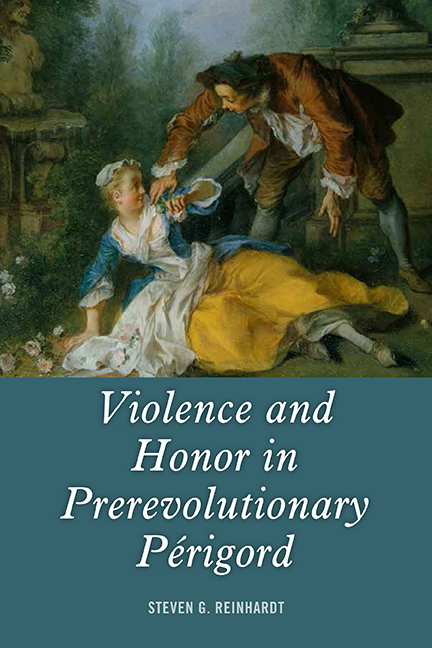Book contents
- Frontmatter
- Dedication
- Contents
- Acknowledgments
- Maps
- Introduction: “The Saint of Honor”
- 1 Violence and Honor
- 2 Honor in a Cross-Cultural Context
- 3 From Honor to Honnêteté in Old Regime Europe
- 4 “The Good Old Days” in Prerevolutionary Sarladais
- 5 “The Saint of Honor” in the Sénéchaussée of Sarlat
- 6 Women and Honor-Related Criminal Affaires
- 7 Policing Honnêteté: Shameful, Sinful, and Criminal Conduct
- 8 “Fallen Women” and Infanticide
- 9 Compromised Honor and Dangerous Liaisons
- 10 Honor and Homicide
- Conclusion
- Notes
- Bibliography
- Index
- Frontmatter
- Dedication
- Contents
- Acknowledgments
- Maps
- Introduction: “The Saint of Honor”
- 1 Violence and Honor
- 2 Honor in a Cross-Cultural Context
- 3 From Honor to Honnêteté in Old Regime Europe
- 4 “The Good Old Days” in Prerevolutionary Sarladais
- 5 “The Saint of Honor” in the Sénéchaussée of Sarlat
- 6 Women and Honor-Related Criminal Affaires
- 7 Policing Honnêteté: Shameful, Sinful, and Criminal Conduct
- 8 “Fallen Women” and Infanticide
- 9 Compromised Honor and Dangerous Liaisons
- 10 Honor and Homicide
- Conclusion
- Notes
- Bibliography
- Index
Summary
Although stories of peasants who attacked each other's hats, hair, and heads and who insulted one another by questioning their probity and potency may seem quaint and entertaining yet ultimately trivial, we must remember that these ritualized disputes illuminate the workings of the inhabitants’ code of honor and dramatize the shifting fault lines in rural society during the Old Regime. Because insults, gestures, and blows are essentially sociocultural phenomena, the study of such behavior discloses society's norms and values, which emerge in a kind of mirror image held up to life in the Sarladais. Narratives drawn from the judicial archives of the royal court attest to the persistence of a largely traditional society characterized by a shared culture of honor in which verbal assaults and physical violence were still commonplace. More importantly, however, they simultaneously attest to the continuously evolving relationship between the Sénéchaussée of Sarlat and its inhabitants, as a wider range of litigants were willing to involve official justice in the resolution of disputes that they theretofore had handled personally, or infra-judicially, via either mediation or controlled violence according to the unwritten honor code. The character of honor itself was changing as well: society became more “individuated,” and extended kinship networks retracted until centered primarily on the nuclear family. Accordingly, ties of allegiance and loyalty to the extended family became attenuated, leading individuals to feel less impelled to resort to violence in defense of their collective honor. Instead, they now appealed to royal justice to resolve their disputes. Private cases stemming from violent offenses against persons actually increased and constituted a large proportion of the sénéchaussée's criminal caseload. In an apparent paradox, the increase of criminal cases for interpersonal violence may have been linked to an actual diminution in the incidence of violence.
Historians agree that violence declined in the West, but they remain divided about its causes. In the past forty years, scholars have emphasized the role played by exogamous factors such as the “rise of the state” (à la Max Weber), the “civilizing process” (à la Elias) or the general “advance of capitalism.” In emphasizing any one factor over another, however, we must keep in mind that these concepts are inventions constructed by scholars to describe or characterize human actions and their consequences; in other words, they are the analytical tools historians use to organize and relate facts to one another in meaningful ways.
- Type
- Chapter
- Information
- Violence and Honor in Prerevolutionary Périgord , pp. 243 - 250Publisher: Boydell & BrewerPrint publication year: 2018



